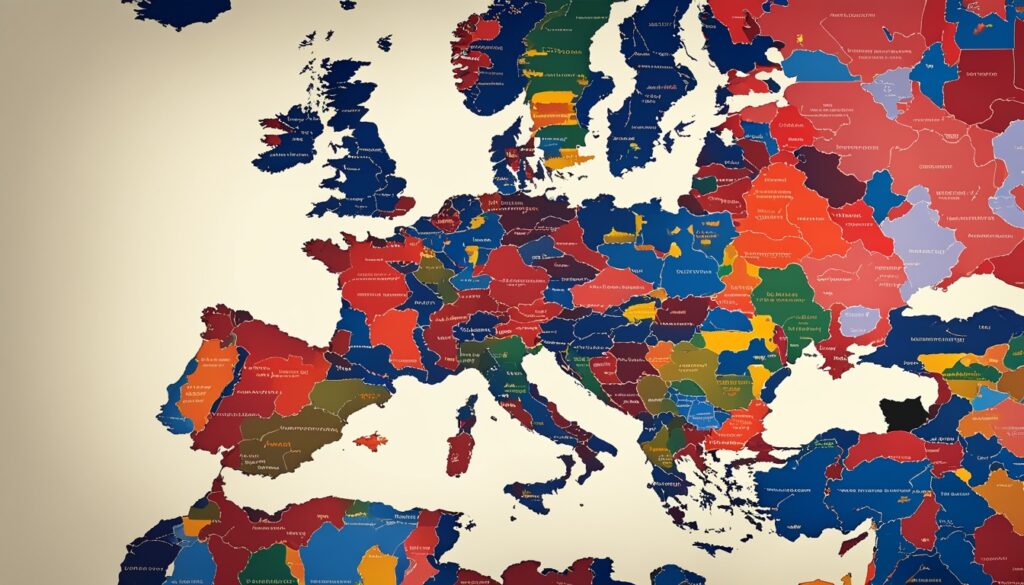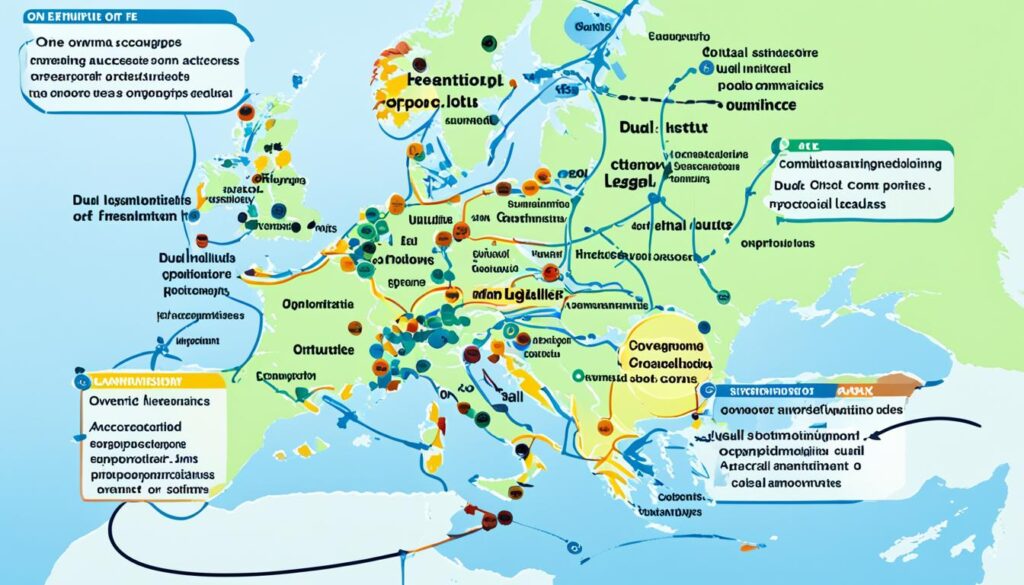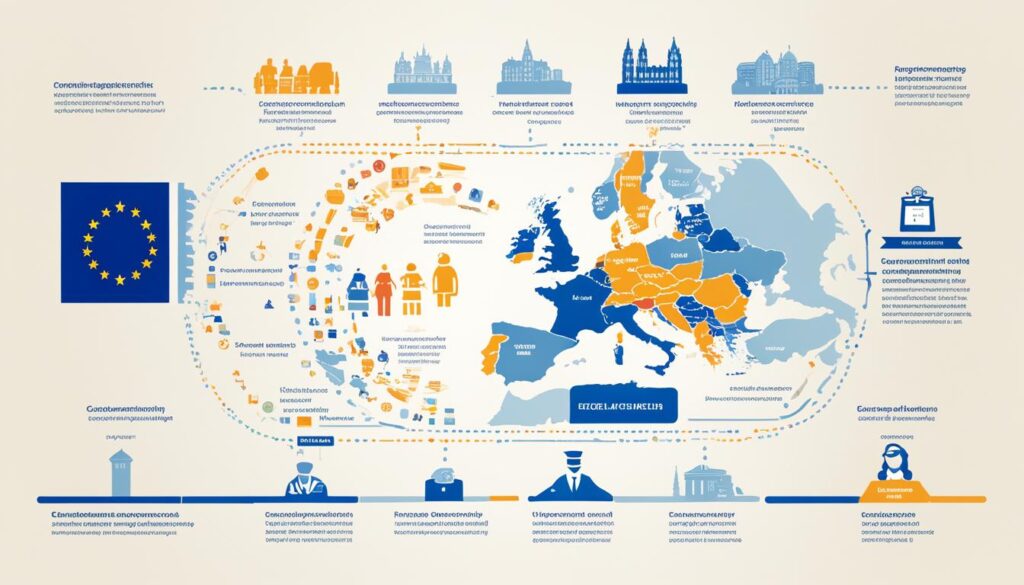Last Updated on: 20th September 2024, 07:23 am
Securing an EU Passport offers unparalleled advantages, including the ability to live and work in any of the 27 member states. If you’re looking for the Easiest EU Country to Get Citizenship in 2024, you’re in the right place. From streamlined residency options to investment programs, there are many pathways to Quick EU Citizenship Acquisition.
Portugal’s Golden Visa program leads the charge with minimal physical presence requirements and a myriad of benefits. Ireland’s simplified naturalization process and descent-based citizenship options further enhance flexibility. Countries like Sweden and Belgium offer permissive regulations, while Malta and Cyprus provide expedited paths through the Citizenship by Investment EU schemes1.
In recent updates, Portugal no longer accepts real estate purchases as qualifying investments in its Golden Visa program from October 20231. Moreover, over 170 countries permit visa-free travel for EU citizens, making the EU Passport highly desirable2.
Key Takeaways
-
- Portugal’s Golden Visa program remains one of the most attractive options for EU citizenship.
- Investment thresholds and requirements vary significantly across different EU countries.
- Over 170 countries allow visa-free travel for EU citizens1.
- Many EU countries, including Ireland and Portugal, offer simplified pathways to citizenship2.
- Citizenship by descent is a viable option in numerous countries like Germany, Italy, and Greece2.
Contact us if you are Interested in Buying Property Abroad!
Introduction to EU Citizenship
Attaining European Union citizenship is a significant step that opens numerous doors for individuals. By holding a nationality in any EU country, one automatically becomes a European citizen, thus gaining access to numerous rights and privileges across all member states.
What is European Citizenship?
European citizenship refers to the legal status granted to nationals of European Union member states. This form of citizenship is distinct from national citizenship, as it extends several standardized rights that transcend national boundaries within the EU. These include the right to live and work in any member country, as well as access to the region’s broad range of public services, such as education and healthcare.
General Benefits of EU Citizenship
One of the most appealing EU Citizenship Benefits is the ability to travel freely across more than 170 countries without the need for a visa. Additionally, European citizens enjoy the right to reside and work in any of the 27 member nations. This expansive landscape of operative freedom not only enhances professional opportunities but also paves the way for improved quality of life.
Moreover, EU citizenship eligibility criteria are uniform across member states, ensuring equality and facilitating easier movement within the region. The protection provided by EU laws ensures that citizens’ rights are safeguarded, thereby maintaining a standard of living that is often considered enviable globally.
On a broader scale, the European Union Citizenship Requirements encapsulate social security advantages, access to national health services, and educational benefits, which are consistent across the continent. For instance, expats constituted 12.9% of Germany’s population in 20203, illustrating how EU citizenship not only enables mobility but also fosters inclusive growth within host countries.
An additional benefit is the potential to transfer citizenship to future generations, granting them the same rights and opportunities, thus ensuring enduring advantages. With global talent shortages, such as those in the UK reaching a 16-year high in 2022, the benefits of EU citizenship remain immensely valuable3.
Easiest EU Country to Get Citizenship in 2024: Why Portugal Tops the List

Portugal stands out as one of the easiest countries to get an EU passport due to its straightforward and accessible path to citizenship. With a minimal physical presence requirement and a favorable economic environment, it is no surprise that many aspiring EU citizens consider Portugal their top choice.
Simple Residency Requirements
One of the most compelling aspects of Portuguese citizenship is its simple residency requirements. Applicants need only reside in the country for five years to be eligible for citizenship, a period that is relatively short compared to other EU countries such as Italy or Spain, which require ten years of residency4. Additionally, the application fee for Portuguese citizenship is just €200, making it both affordable and accessible5.
The Portugal Golden Visa Program
The Portugal Golden Visa program is a significant draw for international investors. The program requires a minimum investment of €250,000 in Portugal’s economy, which can be in the form of real estate, business, or cultural contributions4. The Golden Visa is particularly attractive because it does not impose stringent residency mandates, making it ideal for those who may not be able to live in Portugal full-time.
Key Benefits of Portuguese Citizenship
Obtaining Portuguese citizenship comes with numerous advantages. Firstly, citizens gain visa-free access to 188 countries, enhancing global mobility. The option to hold dual nationality provides added flexibility, and the required language proficiency is relatively attainable at an A2 level. Portuguese citizenship also confers the right to reside, work, and study anywhere in the EU, opening up various opportunities across the continent.
| Country | Residency Requirement | Application Fee |
|---|---|---|
| Portugal | 5 years | €200 |
| Ireland | 5 years | €175 on application, €950 upon approval |
| Sweden | 39 months to 5 years | €150 |
| United Kingdom | 5 years | £1,300+ |
| Netherlands | 5 years | €925 |
In conclusion, Portugal’s straightforward path to citizenship, highlighted by the Portugal Golden Visa program and minimal residency requirements, makes it one of the easiest countries to get an EU passport. The wide range of Portuguese citizenship benefits, including a secure and stable lifestyle, further cements its position as the top choice for 2024.
Citizenship by Descent: A Path Through Ancestry

Citizenship by descent, also known as Ancestry European citizenship, provides a unique avenue for individuals to attain EU citizenship. This option allows people with familial ties to European countries to reclaim the citizenship of their ancestors, offering significant advantages for those who can establish their lineage.
Eligibility Criteria for Descent-Based Citizenship
Eligibility for obtaining EU citizenship by descent varies widely by country. Typically, it includes proving descent from a citizen of the specific European country, such as through parents or grandparents. For instance, Italy offers citizenship through “jure sanguinis,” with no generational limit if there’s an unbroken line of Italian citizenship from the ancestor to the applicant6. On the other hand, Portugal allows for citizenship by descent if you have at least one Portuguese parent or grandparent, with a simplified process for those with a Portuguese parent6. According to data, 17 countries inside the European Economic Area offer EU citizenship to grandchildren, great-grandchildren, or more distant descendants of European citizens7.
Countries Offering Citizenship by Descent
Many European countries provide pathways to citizenship based on ancestry. Countries such as Hungary and Poland have no specified generational limits on eligibility, while others like Ireland and Germany have more defined criteria7. For example, Ireland offers citizenship by descent to individuals with at least one Irish parent or grandparent6. More than half a billion people outside of Europe have claims to European ancestry, though not all will be able to prove it7. In the United States alone, over 30 million Americans identify as being of at least partial Irish descent8.
Application Process for Ancestry-based Citizenship
The citizenship application process for descent-based citizenship generally involves several steps. Applicants must provide documentation proving their ancestry, such as birth and marriage certificates that establish the citizenship chain. For countries like Hungary, it might also include language proficiency tests7. Additionally, Poland allows citizenship by descent for those proving their Polish ancestry without interruption in the citizenship chain6. The application process may also require establishing residence and demonstrating financial stability, depending on the country.
Each nation has its own specifics, making it essential to understand the requirements before beginning the citizenship application process. Countries like Slovakia and Czechia have recently updated their laws to facilitate easier access to citizenship for descendants8. With the combination of historical connections and modern legal frameworks, Ancestry European citizenship remains an accessible and appealing pathway for those with European roots.
Simplified Naturalization Process in Ireland

The journey of obtaining Irish citizenship is structured yet streamlined, making it an appealing option for many seeking the benefits of EU citizenship.
Residency Requirements in Ireland
One of the initial steps in the Irish citizenship process involves fulfilling residency requirements. Applicants must reside in Ireland for five years to be eligible for naturalization9. This is consistent with other EU countries, such as Portugal and France, which also mandate a minimum of five years of residency for naturalization10. Notably, Ireland does not impose a language proficiency requirement, which simplifies the process compared to other countries like France, where demonstrating language skills is a requisite10.
Cost and Fees for Naturalization
The cost associated with the naturalization process in Ireland can be significant and requires careful financial planning. Fees are stipulated for the application and the issuance of the naturalization certificate, making it a critical aspect to consider for potential applicants. Additionally, the waiting time for receiving the naturalization certificate ranges from two to four years9. This period is comparatively favorable when considering other European nations, where the process might be more protracted. For instance, Spain requires a minimum investment of EUR 500,000 for its Golden Visa program10, which is an alternative route that entails substantial financial commitments.
Benefits of Irish Citizenship
Achieving Irish citizenship comes with numerous advantages, notably obtaining automatic EU citizenship. This status allows easy access to the UK and EU job markets, enhancing employment opportunities significantly. Furthermore, the benefits of EU citizenship extend to healthcare and education, providing residents with comprehensive support systems. For many, the flexible residency route provided by the Irish Immigrant Investor Programme offers an accessible pathway to achieving these benefits9. By becoming an Irish citizen, individuals can enjoy the full spectrum of freedoms and rights that come with being part of the EU, including visa-free travel across member states.
For more detailed information on the process and requirements, visit the official Irish immigration website.
Dual Citizenship in Europe: Understanding The Pros and Cons

Dual citizenship in Europe offers a unique set of advantages and disadvantages that individuals should carefully weigh before making a decision. While the concept of holding citizenship in more than one country can be appealing, understanding its full implications remains crucial.
Countries Allowing Dual Citizenship
Most European countries permit dual citizenship. For instance, nations such as Italy, France, and Ireland recognize the benefits of allowing their nationals to hold multiple citizenships. This gives citizens the flexibility to reside, work, and retire in any EU member state, thanks to the principle of free movement within the European Union11.
However, it is important to note that not all countries in the EU are accommodating. Countries like the Netherlands and Germany typically restrict dual citizenship under certain conditions. The general trend, nonetheless, shows increasing acceptance, as dual citizenship can lead to enhanced personal and professional opportunities11.
Legal Complications and Considerations
The legal implications of dual nationality should not be underestimated. One of the primary concerns includes the potential for dual taxation, where individuals might be required to pay taxes in both their countries of citizenship. For instance, American citizens with dual nationality might face obligations to the IRS even if they reside in Europe.
Furthermore, dual citizenship can bring about political obligations and conflicts, especially if the involved countries have differing stances on specific international issues. This could subject individuals to complications such as mandatory military service or heightened scrutiny from governmental bodies12.
Statistics reveal that the acceptance of dual citizenship has significantly grown worldwide. In 1990, only 45% of countries allowed dual citizenship, whereas by 2020, around 76% of 200 countries had embraced the concept for their nationals12. This shift underscores a global trend towards recognizing the benefits of dual nationality.
In conclusion, while dual citizenship in Europe may offer enviable advantages such as enhanced mobility, access to healthcare and education, and increased career opportunities, it also brings with it a complex web of legal challenges. Potential applicants must engage in thorough planning and seek expert advice to navigate these challenges effectively and maximize the benefits of holding multiple citizenships12.
Fast-track Citizenship: Investment Programs Explained

For those looking to swiftly obtain an EU passport, investment programs in Malta, Cyprus, and Spain present compelling options. These Citizenship by Investment EU programs stand out for their efficiency and accessibility, especially for high-net-worth individuals looking for opportunities within Europe’s lucrative markets.
Maltese Citizenship by Investment
Maltese passport investment is among the most sought-after programs. To gain Maltese citizenship, one must make a minimum investment of 690,000 EUR, which can lead to citizenship within 3 years13. The process includes investment in government bonds, real estate, or contributions to the Maltese National Development and Social Fund. This route not only offers a robust investment portfolio but also provides a gateway to travel, work, and reside across the European Union.
Cyprus Investment Pathway
The Cyprus investment program mandates an investment of at least 300,000 EUR in real estate, along with an annual income of 50,000 EUR to secure residency within 3 months13. The Cyprus pathway offers extensive advantages, including potential citizenship after a five-year residency period. This program is particularly attractive to those seeking opportunities in Europe’s vibrant real estate market while gaining the benefits of EU citizenship.
Spain’s Golden Visa
Spain’s Golden Visa program remains an attractive option for investors. It requires a minimum investment of 500,000 EUR in real estate, facilitating a streamlined process for residency, which must be processed within 20 business days14. Additionally, Spain’s Golden Visa program is popular among those looking to ultimately achieve citizenship by investment EU. Compared to other programs, Spain’s offers a faster route to residency status, elevating its desirability for global investors.
Comparatively, these programs provide unique advantages across various parameters:
| Country | Investment Amount | Processing Time | Citizenship Timeline | Additional Benefits |
|---|---|---|---|---|
| Malta | 690,000 EUR | Approximately 3 Years | 3 Years13 | Extensive travel and work rights in the EU |
| Cyprus | 300,000 EUR | 3 Months for Residency13 | 5 Years Residence | Favorable tax regime and business environment |
| Spain | 500,000 EUR | 20 Business Days14 | 10 Years | Access to Schengen area |
While Malta and Cyprus offer accelerated timelines to residency and citizenship, Spain’s Golden Visa allows investors to swiftly obtain residency with the eventual goal of citizenship. The variations in processing times, investment amounts, and additional benefits cater to different investor preferences and needs.
Contact us if you are Interested in Buying Property Abroad!
European Union Citizenship Requirements: A Comparative Overview

Acquiring citizenship within the European Union involves meeting various conditions, including residency requirements, language proficiency, and legal documentation. Understanding these elements can considerably aid in navigating the process of obtaining EU citizenship.
Residency Requirements Across EU Countries
Residency requirements for EU citizenship differ significantly across member countries. Generally, prospective citizens must live in an EU country for several years, with durations varying from 3 to 10 years depending on the specific nation’s policies. For example, the residence permit for researchers in an EU country is valid for a minimum of one year and up to two years if covered by certain mobility programs15. Additionally, long-stay visas for researchers are valid for up to one year, and researchers must apply for a residence permit before the visa expires for longer stays15. Such considerations are crucial components of the broader EU citizenship eligibility criteria.
Language Proficiency and Integration Tests
Language proficiency and integration tests are integral to the process of securing citizenship in many EU countries. These countries typically mandate applicants to pass designated exams or complete approved courses that assess their understanding of the local language and cultural norms. For example, after completing their research project, researchers can stay in the EU country for at least nine months to seek employment or establish a business, provided they have a specific residence permit15. These integration tests for EU citizenship ensure that newcomers can smoothly integrate into society, thereby facilitating their overall transition.
Legal and Document Requirements
Meeting the legal and document requirements is another vital aspect of the EU citizenship application process. Applicants typically need to submit various documents including proof of residence, financial statements, and criminal record checks. In 2017, 825,000 individuals became citizens of an EU Member State, with most acquisitions occurring in Italy, the United Kingdom, Germany, and France16. Researchers are also granted similar treatment as citizens regarding working conditions, education, social security, tax benefits, and access to public goods15. This alignment ensures that new citizens are adequately supported within their new surroundings.
Moreover, the rights and legal protections under EU law provide substantial additional benefits to successful applicants, encompassing more than just the attainment of citizenship but also encompassing the freedom to vote and run as candidates in elections across member states15. With 20 EU Member States having signed the European Convention on Nationality and 13 having ratified it, these regulations form a comprehensive framework for prospective EU citizens to navigate16.
The Fastest Way to Obtain EU Citizenship: A Focus on Greece
Greece stands out as a prime destination for those seeking the fastest way to obtain EU citizenship through its favorable Greece Golden Visa program. This program continues to attract many high-net-worth individuals who see EU citizenship as a valuable asset17. The Greece Golden Visa requires various level of commitments, making it a versatile choice for different investors.
Golden Visa Requirements in Greece
The Golden Visa program in Greece allows foreign investors to gain residency rights and eventually citizenship by making qualifying investments. Investors must start with a minimum investment in real estate of €250,000. However, depending on the area of investment, this amount can go up significantly. For instance, in 2024, the minimum investment threshold in certain regions has increased to €400,000, while in other areas, it’s as high as €800,00018. This increase aims to balance the growth in property demand across different regions.
For those looking to secure the current investment thresholds, there is an opportunity to make a 10% deposit before August 31st and complete their investment by December 31, 202418. It’s also noteworthy that the program no longer accepts short-term rentals like Airbnb or Vrbo as a valid investment option18. This shift ensures that only strategic investments contribute to the program, such as acquiring shares or bonds with a minimum capital contribution of €500,000 or investing in an Alternative Investment Fund (AIF) focused on Greece18.
Investment Threshold Changes in 2023 and 2024
In recent years, the investment thresholds for the Greece Golden Visa have undergone significant changes to adapt to market conditions. As of 2023, the required investment in areas like Athens and Thessaloniki doubled to €500,00018. This adjustment is crucial for maintaining a balanced influx of foreign capital across the country.
A quintessential feature of the Greece Golden Visa is that it permits family reunification, allowing immediate family members to obtain residency rights18. This program not only offers a pathway to permanent residency but also provides a gateway to citizenship after seven years of continuous residency and maintaining the investment18. These modifications make the Greek program one of the most attractive options in Europe for obtaining citizenship through investment.
Finally, prospective investors should be aware of the various investment avenues available under the Greece Golden Visa program. These include real estate acquisitions, financial assets such as Greek government bonds, and business investments requiring direct capital contributions into a Greek enterprise18.
Advantages of EU Citizenship: Opportunities and Mobility

Obtaining EU citizenship offers a plethora of benefits that significantly enhance personal and professional life. The advantages of EU citizenship span from the right to work and reside in any EU country to access to comprehensive healthcare and top-tier educational systems.
Work and Residency Rights
EU citizens enjoy the freedom to live and work in any EU member state, including countries like Switzerland, Norway, and Iceland. This privilege creates vast opportunities for career growth and personal development. For those who wish to start a business, the EU guarantees the right to conduct business in any member state, Iceland, Norway, or Liechtenstein, with streamlined registration processes facilitated by local authorities19. Additionally, EU citizens have access to the region’s most lucrative job markets, such as those in Switzerland, Iceland, and Norway, which offer some of the highest salaries in Europe19.
Access to Healthcare and Education
A significant advantage of EU citizenship is the access to national healthcare systems across the EU. Countries such as Germany, Norway, and Finland offer healthcare services renowned for their quality and efficiency. Moreover, EU citizens benefit from affordable or free education in member states like Iceland, Norway, and Germany, where university tuition fees are significantly lower, even for international EU students19. This accessibility ensures that education remains a key pillar of societal development and personal achievement.
Visa-Free Travel Benefits
One of the most appealing advantages of EU citizenship is the ability to enjoy visa-free travel with an EU passport. An EU passport facilitates visa-free or visa-on-arrival access to over 170 countries worldwide, offering unparalleled global mobility. For instance, Polish citizens can travel visa-free or obtain visas on arrival in 189 countries, ranking the Polish passport 6th globally according to the Henley Passport Index19. Furthermore, the Schengen Area guarantees free movement within its borders for over 425 million citizens and non-EU nationals, simplifying travel for tourism, business, or education purposes19.
For more in-depth information about the comprehensive benefits of EU citizenship, you can read more on the detailed advantages here.
Residency Requirements for EU Citizenship: Living in the EU
Understanding the EU residency requirements is crucial for those aspiring to obtain citizenship. To begin with, each country has its own pathways to residency, which are often a precursor to permanent residency and eventually citizenship. While temporary residency is typically easier to acquire, permanent residency in the EU offers more stability and benefits.
Permanent Residency Pathways
Permanent residency in the EU can be achieved through various pathways such as employment, investment, or family reunification. For instance, Portugal’s Golden Visa Program requires an investment of about 280,000 EUR and can grant residency within six months20. Conversely, Greece requires an investment of at least 250,000 EUR with a mandatory seven-year residency before one can apply for citizenship20. These investment programs highlight the importance of planning when seeking both EU residency and subsequent citizenship. Additionally, the process of naturalization generally requires one to live or work in an EU country for a minimum of five years21.
Temporary vs. Permanent Residency
Temporary residency is often the first step toward achieving permanent residency. Temporary residency permits are usually granted to individuals who move to the EU for work, study, or family reasons. After maintaining a temporary residency status for a certain period, often between three to five years, one can apply for permanent residency in the EU21. Temporary residency can be less restrictive, but achieving permanent residency offers more benefits such as increased mobility, access to social services, and an eventual path to citizenship.
Many EU countries also offer programs that assist in obtaining permanent residency more quickly through investment schemes. For example, Malta provides multiple programs aimed at facilitating the journey towards an EU passport20.
Italy and Spain: Comparing Residency and Citizenship Options
Both Italy and Spain present compelling paths for individuals seeking residency and citizenship in Europe. Although different in their requirements, both countries offer strategic advantages through their Golden Visa programs and long-term residency options.
Long-term Residency Requirements
Spain’s residency pathway includes the Spain residency and citizenship through a Golden Visa, which requires a minimum real estate investment of €500,00022. Applicants can apply for permanent residency and eventually citizenship after residing in the country for ten years and demonstrating knowledge of Spanish culture and language22. In contrast, Italy provides a unique mix of options like the Italy Golden Visa program, extending a residency permit for two years upon investment in sectors such as startups or real estate23. These options make it feasible to maintain long-term residency and navigate towards citizenship.
Golden Visa Programs
Both countries also offer highly appealing Golden Visa programs. The Italy Golden Visa allows investors to obtain residency through significant contributions to startups or by meeting financial self-sufficiency criteria23. Meanwhile, Spain’s Golden Visa program not only requires a minimum investment of €500,000 in real estate but also offers the potential for permanent residency and citizenship after a decade22. Each of these programs provides a valuable pathway for international investors to secure their stay and eventually enjoy the benefits of European citizenship.
Conclusion
Embarking on the journey of EU citizenship acquisition entails a meticulous citizenship application strategy that varies widely depending on the chosen pathway. Critical routes include residency, descent, marriage, and investment, each presenting unique benefits and requirements. Portugal, Malta, Spain, and Greece stand out as options due to their respective programs that simplify attaining citizenship. For instance, Portugal’s Golden Visa program is renowned for its flexibility and investment options, while Greece offers a lucrative Golden Visa program that recently underwent significant changes24.
The appeal of EU citizenship remains strong, with advantages such as freedom of travel, economic opportunities, and improved lifestyle prospects. Notably, EU citizenship allows for visa-free travel within all 27 member states and provides additional international travel privileges25. Citizenship by investment, particularly in countries like Malta, offers expedited pathways, although the number of such programs is decreasing in Europe24. Additionally, individuals with EU citizenship gain access to the European Economic Area, encompassing over 453 million people, alongside tax-friendly conditions in countries like Cyprus and Ireland25.
Analyzing the available options, it is evident that the most suitable path to EU citizenship will depend on individual circumstances and goals. The allure of residency, exceptional healthcare, and educational services enhances the appeal. As EU nations continue to refine their policies to attract global citizens, aspiring individuals should remain informed and strategically plan their application approach to ensure success in obtaining EU membership2524.
Contact us if you are Interested in Buying Property Abroad!
FAQ
What is European Citizenship?
What are the general benefits of EU citizenship?
Why is Portugal considered the easiest EU country to get citizenship in 2024?
What is the Portugal Golden Visa Program?
What are the key benefits of Portuguese citizenship?
Who is eligible for descent-based citizenship in the EU?
Which countries offer citizenship by descent?
What is the application process for ancestry-based citizenship?
What are the residency requirements for naturalizing in Ireland?
What are the costs and fees associated with naturalization in Ireland?
What are the benefits of Irish citizenship?
Which European countries allow dual citizenship?
What are the legal complications related to dual citizenship?
How does Malta's Citizenship by Investment program work?
What is the Cyprus Investment Pathway for citizenship?
What are the requirements for Spain's Golden Visa?
What are the residency requirements across EU countries?
What are the language proficiency and integration tests like?
What are the legal and document requirements for EU citizenship?
What are the requirements for Greece's Golden Visa?
What are the advantages of EU citizenship?
What are the pathways to permanent residency in the EU?
What is the difference between temporary and permanent residency in the EU?
What are the long-term residency requirements in Italy and Spain?
How do Italy and Spain's Golden Visa programs compare?
Source Links
- https://getgoldenvisa.com/how-to-get-eu-citizenship
- https://www.globalcitizensolutions.com/eu-citizenship/
- https://finance.yahoo.com/news/10-easiest-countries-europe-citizenship-160429670.html
- https://imin-malta.com/blog/easiest-eu-citizenship/
- https://www.globalrcg.com/post/easiest-countries-to-get-citizenship-in-europe
- https://www.globalcitizensolutions.com/eu-citizenship-by-descent/
- https://www.imidaily.com/europe/the-complete-list-of-eu-citizenship-by-ancestry-descent-policies/
- https://www.malakoutilaw.com/8-european-citizenships-by-descent-you-may-qualify-for-in-2023
- https://globalresidenceindex.com/easiest-european-countries-to-get-citizenship/
- https://harveylawcorporation.com/easiest-european-countries-to-get-citizenship/
- https://www.italiandualcitizenship.net/the-benefits-of-having-dual-citizenship-in-the-eu-european-union/
- https://www.ntltrust.com/news-/news-crbi/2023/10/6/understanding-dual-citizenship-pros-and-cons
- https://wise.com/us/blog/easiest-countries-to-get-citizenship
- https://nomadcapitalist.com/global-citizen/golden-visa-eu-residence-by-investment-programs/
- https://immigration-portal.ec.europa.eu/general-information/what-category-do-i-fit_en
- https://home-affairs.ec.europa.eu/system/files/2020-07/cyprus_pathways_to_citizenship_2019_en.pdf
- https://www.henleyglobal.com/newsroom/industry-insights/easiest-country-citizenship
- https://globalresidenceindex.com/greece-golden-visa/
- https://www.legallyineurope.com/passports-of-the-european-union/15-must-know-benefits-of-becoming-an-eu-citizen-and-moving-to-europe
- https://wise.com/us/blog/how-to-get-eu-citizenship-as-an-american
- https://www.apply.eu/passport/
- https://getgoldenvisa.com/easiest-countries-to-get-citizenship
- https://themigrationbureau.com/2024/06/05/the-top-five-easiest-countries-to-immigrate-to-in-the-eu/
- https://www.schiffsovereign.com/lifestyle-design/3-ways-to-get-a-european-passport-17283/
- https://nomadcapitalist.com/global-citizen/what-is-eu-citizenship-how-to-get-it/
Best Countries According to Aparthotel.com
- Best Countries To Live In Europe
- Best Countries To Move To From Canada
- Best Country To Live In 2024
- Top Birth Tourism Countries
- Cheapest Asian Country To Live In
- Cleanest Country In The World
- Countries With No Capital Gains Tax
- Countries That Allow Dual Citizenship
- Countries With No Income Tax
- Countries With No Inheritance Tax
- Countries With No Property Tax
- Easiest Countries To Move To From USA
- Easiest EU Country To Get Citizenship
- Hardest Countries To Immigrate To
- Highest Tax Paying Country
- Instant Citizenship Countries 2024
- Least Corrupt African Countries
- Lowest Tax Countries 2024
- Non Extradition Countries
- Safest Countries In Africa
- Safest Countries In Europe
- Safest Country In Asia
- Safest Country In The World 2024
- Safest Latin American Countries
- Second Passport Countries
- Territorial Tax Countries 2024
- Which Country Pays Highest Salary
- Most LGBT Friendly Countries 2024
- Best Countries For Expats 2024
- Best Countries for Work-Life Balance 2024
- The Best Countries For Hiking Adventures 2024
- Best Countries for Expat Healthcare 2024
- Safest Countries For Women Travelers 2024
- The Best Country For Safari Adventures 2024
- Top Solo Travel Destinations for Adventure Seekers 2024
- The Best Solo Trips For Women 2024
- Best Countries For Disabled Veterans 2024
- Top Countries for Plastic Surgery 2024
- Top Countries for All Inclusive Resort Vacations 2024
- Top Countries With The Best Food Worldwide 2024
- Best Countries For Black Expats 2024
- Top Countries for Education 2024
- Best Places To Retire In The World 2024
- Top Countries for Transgender Expats to Live 2024
- Best Places For Passport Bros 2024
- Top 10 Best Countries For Surfing 2024
- Top Countries for Digital Nomads 2024
- Top European Countries for English Speakers to Live 2024
- Top Countries for Software Engineers to Thrive 2024
Best Countries For Citizenship by Aparthotel.com
- What is Citizenship By Investment?
- Acquiring Citizenship By Marriage
- Benefits Of EU Citizenship For American Expats
- Countries That Allow Dual Citizenship
- Easiest EU Country To Get Citizenship
- Instant Citizenship Countries

As a passionate, global-thinking Real Estate Investor I am constantly looking for the best opportunities to invest in Properties. With Aparthotel.com I am building an All-In-One Global Real Estate Platform, where people can analyse, rent or invest in properties. Additionally I help Investors with comparing the best financing options as well as give detailed Consultation on the buying process for Real Estate Investments around the world. I am looking forward to sharing my knowledge on this Website and feel free to reach out to me if you have any questions.

Comments